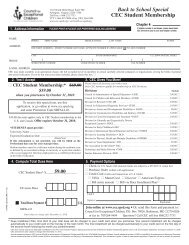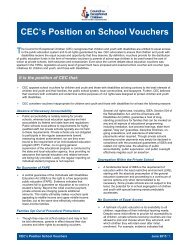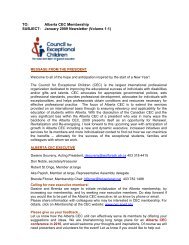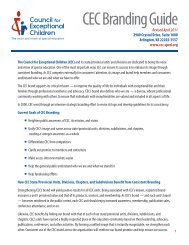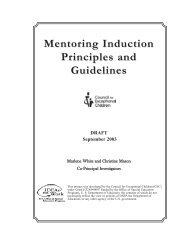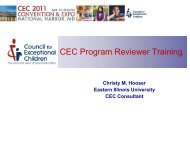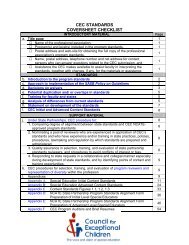What Every Must Know Special Educator - Council for Exceptional ...
What Every Must Know Special Educator - Council for Exceptional ...
What Every Must Know Special Educator - Council for Exceptional ...
Create successful ePaper yourself
Turn your PDF publications into a flip-book with our unique Google optimized e-Paper software.
Teaching and America’s Future (NCTAF, 1996) used a<br />
three-legged stool to describe the three primary levers<br />
to influence teacher quality:<br />
• Accreditation of teacher preparation<br />
programs,<br />
• Initial licensing of entry-level teaching<br />
professionals, and<br />
• Advanced certification of teaching<br />
professionals.<br />
CEC National Recognition of Preparation<br />
Programs<br />
In 2002, CEC made it policy that preparation<br />
programs, whether traditional or<br />
alternative, should demonstrate their<br />
alignment with CEC standards through<br />
submission to CEC per<strong>for</strong>mance-based<br />
review. The first leg of the metaphorical<br />
stool <strong>for</strong> assuring teacher quality is<br />
national recognition of programs preparing<br />
educators. In the United States,<br />
there are currently two governmentrecognized<br />
agencies to accredit teacher<br />
education programs: National <strong>Council</strong><br />
<strong>for</strong> Accreditation of Teacher Education<br />
(NCATE) and the Teacher Education<br />
Accreditation <strong>Council</strong> (TEAC). Both of<br />
these agencies base their accreditation<br />
approaches on the importance of establishing<br />
teaching as a full and mature<br />
profession. However, the two are built on different<br />
concepts to achieve professionalism.<br />
National <strong>Council</strong> <strong>for</strong> Accreditation of Teacher<br />
Education<br />
To NCATE, the foundation of a strong profession is a<br />
shared body of specialized knowledge and skill based<br />
on research, and public confidence that professionals<br />
are fit to practice. Speaking <strong>for</strong> NCATE, Art Wise<br />
states that only a strong degree of consensus among<br />
practitioners and practitioner educators can build<br />
that confidence (Wise, 2005). NCATE is built on the<br />
premise that strong professions depend upon “collective<br />
organization” and that accrediting bodies in the<br />
“mature professions” have played a catalytic role as<br />
the repositories of the consensus about the professions’<br />
specialized knowledge and skill.<br />
Since 1977, NCATE has been accrediting teacher<br />
education programs using an inclusive model of collaborating<br />
with the respective professional associations<br />
representing the various professional disciplines (i.e.,<br />
English, Social Studies, Math, School Psychology) For<br />
almost 20 years, CEC has been the partner of NCATE<br />
representing the disciplines within the special education<br />
profession.<br />
Candidates preparing to work in schools as teachers<br />
or other professional school personnel know and<br />
demonstrate the content, pedagogical, and professional<br />
knowledge, skills, and dispositions necessary<br />
to help all students learn. Assessments indicate that<br />
candidates meet professional (emphasis added), state,<br />
and institutional standards.<br />
In addition to requiring preparation programs to<br />
demonstrate that their candidates have a positive<br />
influence on student learning, NCATE expects<br />
preparation programs to demonstrate through per<strong>for</strong>mance<br />
in<strong>for</strong>mation that the programs address<br />
the professional standards of the respective associations<br />
in preparing candidates <strong>for</strong> both initial<br />
and advanced roles. Through this process, NCATE<br />
expects programs preparing special educators to<br />
demonstrate candidates’ mastery CEC standards.<br />
NCATE currently has <strong>for</strong>mal agreements with 50<br />
of the U.S. states and territories. It has reviewed<br />
and approved over 600 teacher education units<br />
with approximately 100 units in the process<br />
(Wise, 2005). Over 70% of entering educators each<br />
year currently graduate from NCATE accredited<br />
programs. Currently 29 states require all of their<br />
special education preparation programs to submit<br />
<strong>for</strong> CEC recognition. The remaining states<br />
have signed agreements that they will to move<br />
their state program approval standards into alignment<br />
with CEC standards. Through 2007, CEC has reviewed<br />
and approved over 1,000 special education preparation<br />
programs. For every teacher education institution<br />
undergoing NCATE accreditation, CEC reviews an<br />
average of three programs.<br />
In its partnership with NCATE, CEC operates comprehensive<br />
systems to prepare and provide program<br />
reviewers, and to provide multiple levels of program<br />
preparation technical assistance. Please note that CEC<br />
has not included in<strong>for</strong>mation in this section to help<br />
faculty prepare <strong>for</strong> CEC and NCATE accreditation. To<br />
ensure that faculty receives the most accurate and upto-date<br />
guidance, in<strong>for</strong>mation on the multiple ways<br />
CEC offers support in the development of program reports<br />
can be found on the CEC Professional Standards<br />
Web site.<br />
Teacher Education Accreditation <strong>Council</strong><br />
It has been TEAC’s position that educators have not<br />
achieved the consensus on specialized knowledge and<br />
SECtion : aSSuring WEll-prEparEd SpECial EduCation proESSionalS 11



